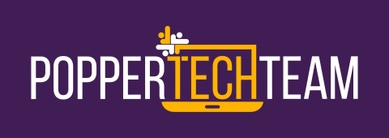Joe Popper
/ August 22, 2024
About Us
Welcome to Popper Tech Team, where our mission is to empower small and medium businesses through cutting-edge technology solutions and expert IT support. Founded by Joe Popper, a serial entrepreneur with a passion for technology and a proven track record in the Managed Service Provider (MSP) industry, Popper Tech Team is dedicated to making our clients successful and developing talented engineers.
Popper Tech Team offers comprehensive IT service and support to small and medium business for a fixed monthly price. This gives you technology leverage and predictability with IT services. To augment monthly services we provide project services to assist with your migration to the cloud or enabling your next technology solution. If you need business consulting to understand how technology can assist, we can provide that as well.
Joe Popper has created successful MSPs previously as a Founder and CEO, bringing a wealth of experience and insight into the ever-evolving world of IT. His love for technology and deep understanding of business processes drive our company’s approach to service delivery. At Popper Tech Team, we believe that by understanding our clients’ unique business needs, we can implement technology solutions that not only meet their IT and business optimization requirements, but also help them thrive. By leveraging our expertise in Microsoft, Apple, Cloud Technology, and Cloud Virtualization, we provide comprehensive solutions that drive performance and innovation.
Fully self-funded, Popper Tech Team operates with the agility, drive, and independence needed to respond quickly to client needs and industry changes. Our team of dedicated professionals is passionate about delivering the highest quality of service, ensuring that our clients have the tools and support they need to succeed in a competitive market.
Join us at Popper Tech Team, where we blend experience, technology, and business acumen to create customized solutions that foster growth and efficiency. Let us help you unlock your business’s full potential with our expert IT services and strategic guidance.


